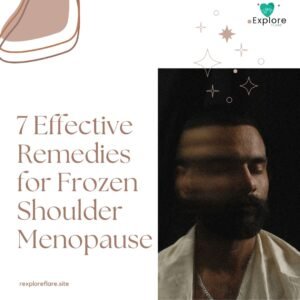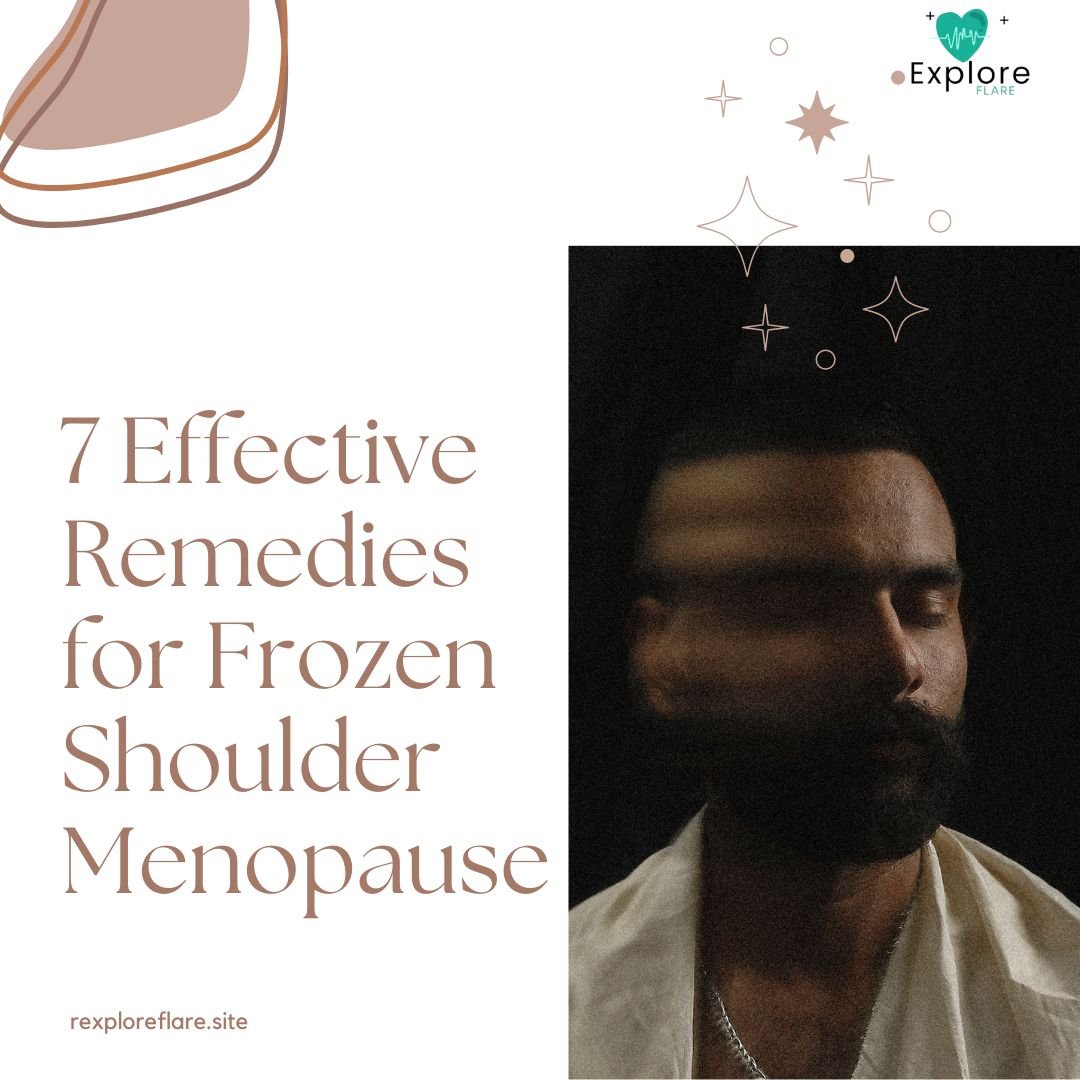7 Effective Remedies for Frozen Shoulder Menopause

Introduction: 7 Effective Remedies for Frozen Shoulder Menopause
Frozen shoulder menopause also known as sticky capsulitis is a disorder characterized by stiffness and pain in the shoulder joint. It can occur for a top variety of causes including hormonal changes that are specially common after menopause. Estrogen fluctuations during this time might cause changes in connective tissues rendering women extra prone to injuries such as frozen shoulder. This article looks at seven effective ways to relieve frozen shoulder problems especially for women going through menopause.
Understanding Frozen Shoulder Menopause
Before delving into treatments it’s critical to understand what frozen shoulder is. It normally goes through three stages:
- Freezing Stage: This initial phase can last anywhere from six weeks to nine months and is characterized by growing pain and gradually diminishing range of motion.
- Frozen Stage: The pain may subside, but the shoulder stiffens, making it difficult to do daily duties.
- Thawing Stage: This final phase might last several months or years and involves a gradual recovery of motion. While the disorder can affect anybody it is most frequent in women and those over the age of 40 especially around menopause.
Remedy 1: Exercise based recuperation Frozen Shoulder Menopause
Active recuperation is one of the best medicines for frozen shoulder. A specialist who works in non-intrusive treatment can make a recovery plan that incorporates:
- Scope of Development Activities: Delicate stretch and versatility drills will assist you with reestablishing adaptability.
- Building activities: Once your mobility has improved exercises that strengthen can help you maintain shoulder stability.
- Manual Therapy: Clinicians utilize techniques to assist relieve discomfort and enhance movement.
Regular therapy can help break the cycle of stiffness and discomfort yielding long-term benefits.
Remedy 2: Heat and Cold Therapy Frozen Shoulder Menopause
For the purpose of treating frozen shoulder discomfort and inflammation using heat and cold packs can be helpful. Here’s how to make excellent use of them:
- Heat Therapy: Using a best heating pad or compress can ease tense muscles and enhance blood flow. This works especially well before you begin an exercise program.
- Cold Therapy: Applying a cold pack helps ease severe pain and reduce inflammation following physical exertion or swelling.
You can effectively manage pain and facilitate healing by alternating between cold and heat.
Remedy 3: Topical Treatments Frozen Shoulder Menopause
Pain from frozen shoulders can be localizedly relieved with topical therapies. Think about the following options:
Capsaicin which is derived from chili peppers best works by desensitizing nerve endings to lessen hard pain. It can take a few best treatments before you see new results.
- Menthol Gel: Peppermint gels can create a cooling vibe that can briefly ease torment and redirect consideration from it.
- Arnica Cream: Applying arnica to the district being referred to can assist with decreasing enlarging and torment as a result of its mitigating qualities.
Before beginning any new topical treatment make sure to speak with your doctor especially if you have sensitive skin or underlying medical issues.
Remedy 4: Yoga and Gentle Stretching Frozen Shoulder Menopause
Yoga has the potential to be a very effective method for addressing frozen shoulder by enhancing flexibility and lowering tension. The following specific poses can help with shoulder mobility:
- Child’s Pose: This posture stretches the upper back and shoulders softly.
- Thread the Needle: This stretch can ease tension and enhance shoulder movement.
- Cow Face Pose: This pose increases flexibility by opening up the chest and shoulders.
During the menopausal transition incorporating yoga and mild stretching into your regimen can help promote calm and ease stiffness.
Remedy 5: Acupuncture Frozen Shoulder Menopause
Frozen shoulder can be relieved with acupuncture a traditional Chinese medical procedure that works by increasing blood flow and decreasing inflammation. Acupuncture may be best beneficial by using tiny needles inserted at particular pain points:
- Reduce Pain: Following acupuncture treatments many patients report experiencing great pain alleviation.
- Enhance Mobility: Consistent therapy can assist increase shoulder range of motion.
Many women have found acupuncture to be a helpful adjunct therapy, especially after menopause even if research on the treatment of frozen shoulder is still underway.
Remedy 6: Nutritional Support Frozen Shoulder Menopause
Diet is critical for in general wellbeing, particularly during menopause. Certain nutrients and minerals assist with working on joint wellbeing and decrease aggravation which is fundamental for controlling frozen shoulder.
- Omega-3 Unsaturated fats: Omega-3s are tracked down in greasy fish flaxseeds and pecans and can assist with diminishing irritation in the body.
- Cell reinforcement Rich Food varieties: Eating products of the soil solid in cancer prevention agents, for example, berries salad greens and nuts can assist with checking oxidative pressure and advance joint wellbeing.
- Vitamin D and Calcium: Satisfactory measures of these supplements are expected for bone wellbeing particularly after menopause. Consider eating dairy products fortified foods and leafy greens or talk to your doctor about supplements.
A well-balanced diet customized to your specific needs will help you maintain good health and relieve frozen shoulder symptoms.
Remedy 7: Lifestyle Modifications Frozen shoulder menopause
Finally, lifestyle modifications might have a substantial impact on controlling frozen shoulder problems.
- Posture Awareness: Maintaining excellent posture particularly while sitting or working on a computer can help to prevent future shoulder discomfort.
- Regular Activity: Low-impact exercises like walking swimming or cycling can help keep the body moving without putting too much tension on the shoulder.
- Stress Management: Excessive stress can worsen discomfort and tension. Consider mindfulness methods meditation or breathing exercises to successfully handle stress.
Adopting a comprehensive strategy that includes lifestyle modifications will help you heal and improve your quality of life throughout menopause.
Conclusion Frozen Shoulder Menopause
Frozen shoulder menopause can be a very annoying ailment particularly for menopausal women. You may control symptoms and regain mobility, though, by putting these seven powerful therapies into practice: physical therapy acupuncture topical treatments yoga heat and cold therapy nutritional support and lifestyle alterations. To guarantee the greatest results always seek medical advice before beginning any new therapy or treatment particularly during menopause. You can restore the health of your shoulders and enhance your general wellbeing by being proactive.

